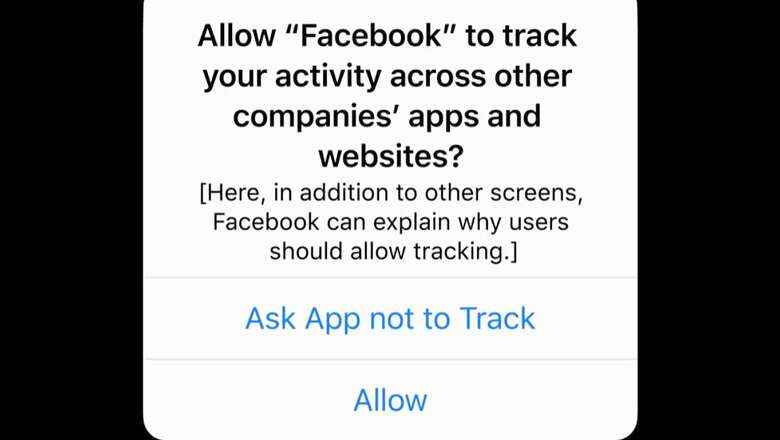
views
It is nothing new. Facebook has been, to anyone willing to hear, complaining about why it feels that Apple’s new and incoming privacy measures with the iOS 14.5 update for the Apple iPhone and the iPadOS 14.5 update for the Apple iPad, are plainly wrong. All the complaints would have you believe that Apple has a single-minded vendetta against Facebook, the social media giant, and against the small businesses that end up advertising on Facebook, Instagram and other social media networks and web-based platforms. In fact, Facebook has launched a new advertising campaign called ‘Good Ideas Deserve to be Found’ in which they say that Apple is taking away the gift of personalized advertisements. Facebook criticizes Apple of attacking small businesses. Nothing could be further from the truth.
Before you make up your mind that personalized adverts are a great thing (which they may be, no one is debating that), you need to understand how they work. There are many apps that feed off your data, knowingly or not, to serve you advertisements on apps and websites. That is their business model. They track you across apps and websites that you access on your smartphone, build a virtual profile based on what you are browsing for, what you are shopping for and what other ads you click on, to serve you personalized adverts which further increases the chances of you clicking on them, resulting in a purchase. You might have often wondered why you see ads very similar to something that you browsed on a shopping website a couple of days ago, on your Facebook or Instagram newsfeed. That’s exactly how.
So, what is Apple doing? The App Tracking Transparency feature that will bring to the forefront a control that would allow users to stop apps from tracking them across apps and websites on their iPhone or iPad. For instance, when you open an app on your iPhone, for the first time or after an update, you will be asked, “Allow XYZ to track your activity across other companies’ apps and websites?” The two options you will have at this stage would be “Ask App not to Track” or “Allow”. The App Tracking Transparency feature will be part of the Privacy menu in the Settings app. This is another addition to the privacy dialup that Apple has implemented with iOS 14 for the iPhone.
You must notice two things here. First, Apple is not ending data tracking and secondly, Apple is not putting an end to personalized advertisements. What is Apple doing? Simply, the company is ending the free run that apps and web platforms have had till now with tracking your usage habits without even a beg your pardon and will now make them ask you for explicit permission, before they can track you. Apps such as Facebook have built entire business models based on your data, without ever asking for your permission for collecting that, at most times.
In a blog post, Facebook says, “Everyone’s News Feed is unique, which means you’re more likely to see content you want to watch, groups you want to join, creators you want to follow, and products and services you want to buy. This discovery is all powered by personalization, and it’s the not-so-secret sauce that helps people discover products and services that match their needs.” And then carries on portraying a very bleak future for small business and also cite their own Facebook 2020 US State of Small Business Report which suggests 47% of small businesses are saying they might not survive the next six months or are unsure of how long they will stay afloat if current circumstances persist. Earlier this year as well, Facebook has taken the help of some data to paint a bleak picture. “Our studies show that when running ads on the Facebook family of apps to drive sales on their websites, small businesses saw a cut of over 60% of their sales, on average, for every dollar they spent when they weren’t able to use their own data to find customers on Facebook,” Facebook had said at the time.
The number, for sure, seems quite high. And in the larger scheme of things, quite worrying. But on their website which makes this claim, Facebook doesn’t exactly say how it has reached this figure, which we assume would be based on two comparative studies. All the social network says in the explanation is “we compared the aggregated results of advertising campaigns that used the advertisers’ own data to optimize for purchases on the advertisers’ websites compared to the results of only using the ad platform’s data. The research analysis includes over 25,000 global advertising campaigns where advertisers were optimizing for purchases run in 2019.”
And this is exactly the number and perception that was preemptively put into perspective by research firm Deloitte in the Digital Tools in Crisis and Recovery: Small and Medium Business Report from October. Simply put, Facebooks says that small businesses would suffer a 60% cut in revenues if they are not able to do personalized advertising. The Deloitte study suggests that just 34% small and medium businesses increased targeted or personalized advertising since the coronavirus pandemic outbreak, with the largest share of that targeted advertising on social media being taken by Telecom and Technology businesses. Among the small and medium businesses around the world, of the percentage of SMBs surveyed for the report, the maximum focus was on India where 62% of such businesses focused on targeted adverts or paid marketing activities on social media. The survey included more than 4,300 SMBs across 17 countries.
While Facebook may continue to rely on advertising to tell us how amazing personalized advertising may be for us, there isn’t a scenario in which Apple is likely to walk back on the promise of implementing App Tracking Transparency. “We believe users should have the choice over the data that is being collected about them and how it’s used. Facebook can continue to track users across apps and websites as before, App Tracking Transparency in iOS 14 will just require that they ask for your permission first,” Apple CEO Tim Cook has already said in a tweet.
What probably worries Facebook is that once Apple does it, Google may also be next to implement such an explicit approval requirement for data tracking, on Android, Google Chrome and more apps and platforms. And that could spell big trouble for Facebook’s business model. And there is that admission, even though it’ll never be worded as such, that when given a choice, most users may not allow apps such as Facebook to track them across the length and breadth of the world wide web. Small businesses can still use the data from users who allow tracking. Small businesses can still use the data Facebook has on users (age, gender, interests, location etc.) and serve their advertisements. And for those who are already customers, small businesses can reach out to them directly anyway. It is Facebook that stands to lose the most, in the middle of all this. The Apple iOS 14.5 arrives anytime now, and we could be embracing a new era of online advertising.
Read all the Latest News, Breaking News and Coronavirus News here




















Comments
0 comment